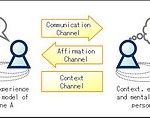Communication (when executed respectfully) is the glue that holds relationships together, the salve that soothes ruffled feathers, and the magnet toward a sense of community.
Barriers to effective communication most often reside within our own perceptual lenses, in our either inability or unwillingness to validly assess another person. This week my Regents Degree Online Program (RODP) students explored how stereotypes impact relational bonds. Their insights are below:
“When we judge someone on the basis of our perception of a group to which he or she belongs we’re using the shortcut called stereotyping” (Robbins & Coulter, 2009, p. 316). Evolutionary psychologists such as D.M. Buss have studied and researched basic human nature of “evolved psychological mechanisms” (D.M. Buss, 1991, 1995, 1999) resulting in such behaviors as stereotyping for years.
Is it nature or nurture that makes “normal” human beings react in such prejudicial thought processes?Can we say that we do not stereotype as individuals or employers in today’s market? It’s nice to think that we are all above the demeaning action of stereotyping, but we are not [Shirley Hines].
*****************************************************************************************************************************************
I read a really interesting article on how the media perpetuates stereotypes. The author of the article ” Media Portrayals and Stereotypes: The Effects of Media Bias and Stereotypes,” states that we should all remember that the news stations and newspapers are a business and as such, their ultimate goal is viewership and ratings. Therefore, the media will sometimes twist situations in order to make it more interesting to viewers, which oftentimes involves human bias and stereotypes.
The answer in terms of people not buying into the stereotypes perpetuated by the media is to be aware of the media agenda, and to get our news from different sources: “Stereotypes are unfair, and in many cases, inaccurate. Based on the research provided and personal experience, the media causes stereotypes and inequality because the messages that they repeatedly show us are eventually absorbed. We should all strive to learn about people individually, instead of judging them based on what we see on TV” (writing.com) [Leigh Merritt].
*****************************************************************************************************************************************
We must keep in mind that these stereotypes are only kept by us.We need to teach our children this lesson because “children acquire negative attitudes toward various social groups through direct and vicarious learning experiences.” (Chapter 5: Perceiving Groups) If we cut the stereotyping off early in life maybe we will see a little difference in our world [Victoria Kulaszewski].
*****************************************************************************************************************************************
I believe if we are going to survive as a society we have to stop being so judgmental of others, but instead observe and see how many things that we have in common. [Rodney Alford].





Recent Comments